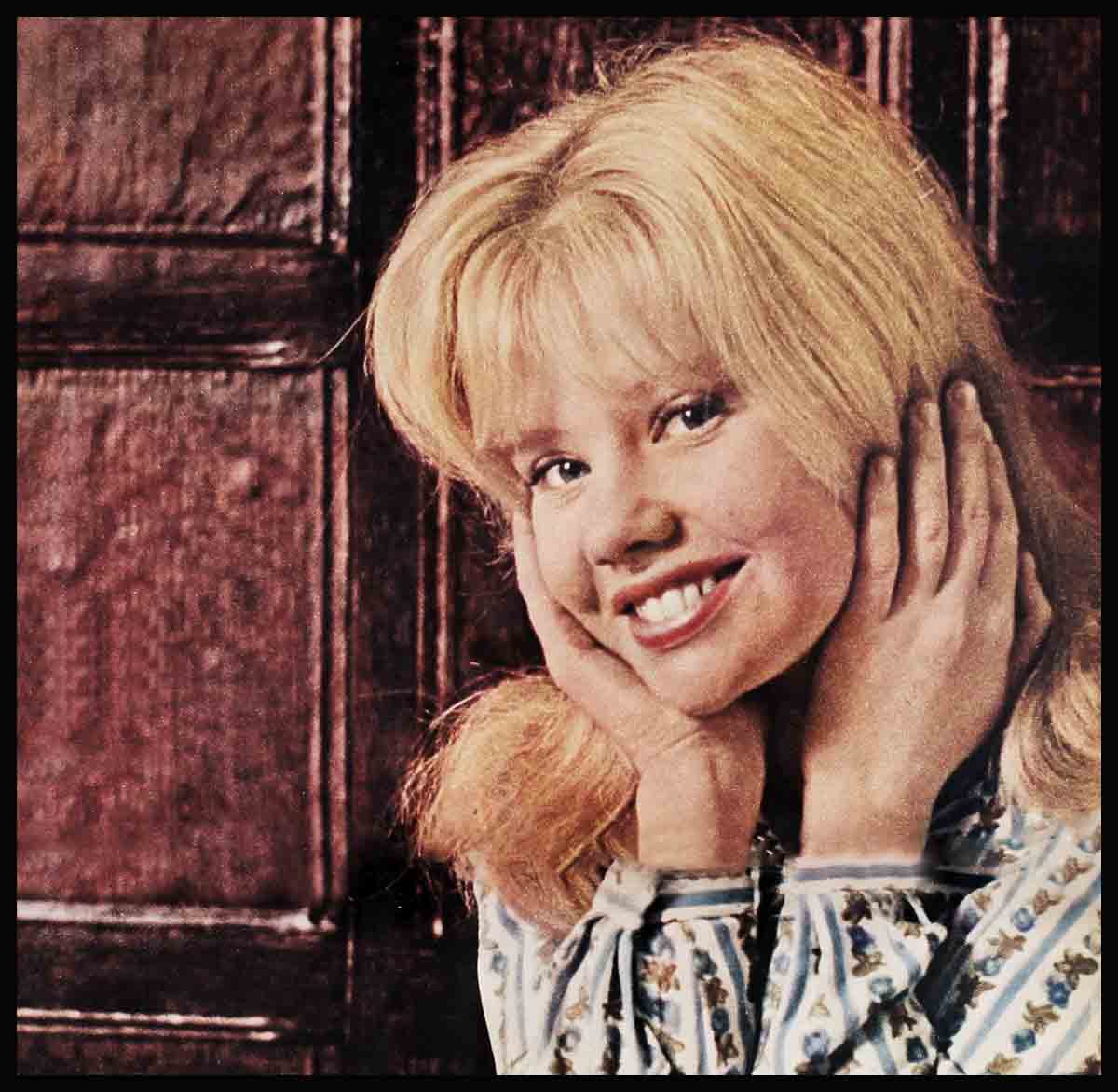
Love Is Just Around The Corner—Hayley Mills
Fred Robbins, nationally known radio and television personality, taped this exclusive interview with Hayley Mills recently in London on the occasion of her happy seventeenth birthday.
FRED: Happy birthday, Hayley Mills. How does it feel to be seventeen, sweet seventeen and never been kissed?
HAYLEY: It doesn’t feel any different, actually. I must say I’m rather disappointed.
FRED: It doesn’t feel any different never to have been kissed, is that what you mean, Hayley—or just to be seventeen?
HAYLEY: Just to be seventeen. I didn’t say anything about the other!
FRED: And you don’t feel any older on this special day? Any wiser?
HAYLEY: No, I don’t really. I don’t think one does. I woke this morning—you have a sort of excited feeling. But that’s just because it’s your birthday. And it’s natural you should be sort of excited on your birthday. But as for feeling older, I am making an effort at it. And wiser? I have my wisdom teeth, but they haven’t done anything for me.
FRED: So many teenage girls are getting married these days. Is it a good time for a marriage? What is your opinion, Hayley?
HAYLEY: Oh, I feel very sorry for them. I think they’re missing such a lot, getting married, and as far as it lasting, well, I don’t know about that; it depends upon who you marry and all that sort of thing. But I think I want to avoid it for some time. I mean, frankly—marriage at seventeen—I think it’s madness because you’re married the whole rest of your life; not that I want to fling around from one boy to another boy; I think when you’re married, it’s a sort of tie. Until you want to be tied and start darning socks, all that sort of stuff, you know. And so if you suddenly say, I’m going away for a week end, you can’t, because you’ve got to tell the milkman to leave two bottles of milk.
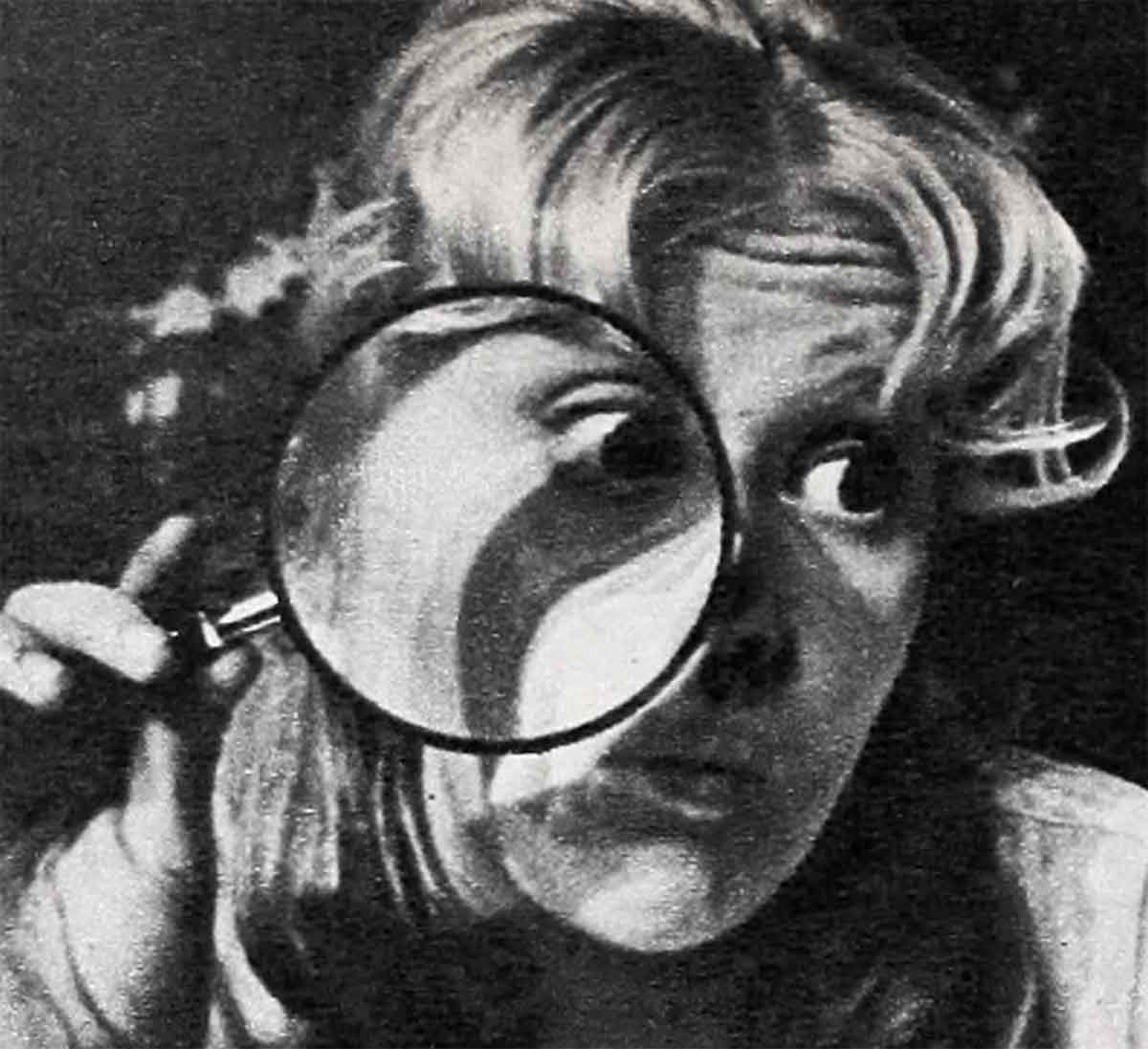
But I don’t want to have someone hanging around my neck, you know; I want to enjoy myself and have fun. Anyway. I like being with my family too much now. I don’t want to cut myself off from them.
FRED: Your sister Julia got married pretty young and she’s happy.
HAYLEY: Yes, she’s very happy. But I think she’s always been a very independent person and I think it was because when she was my age she went to New York which made her feel more grown-up. I think she was more adult at my age than I am now. She was twenty when she married. So that’s quite good.
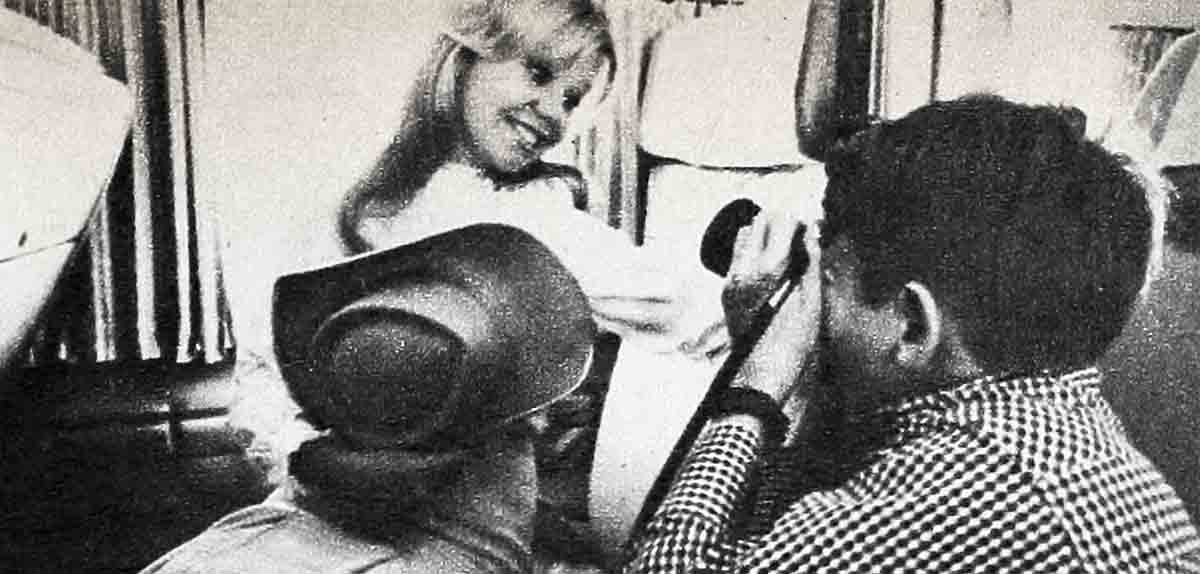
A monster in there
FRED: It’s a very level-headed family, this Mills family, I really think so, and all the way down to the seventeen-year-old.
HAYLEY: Well, to my brother Jonathan—he’s more level-headed than I am. I’m not really very level-headed. You should see my room; you’d think there was a monster in there.
FRED: A little monster named Hayley?
HAYLEY: Yes. Very untidy. Look at this room, I mean; it looks like a bomb has hit it.
FRED: This is typical of women!
HAYLEY: Oh, it isn’t. Most women are terribly, terribly tidy. I tend to leave things where I put them, anywhere.
FRED: That’s charming. I mean, if you were always as neat as a pin and everything had to be in its place, that would reflect on your whole personality. Which is as exuberant and effusive and wonderfully bubbly, you know—that’s you.
HAYLEY: As untidy as my room.
FRED: It’s a marvelous personality. And you bite your nails.
HAYLEY: Oh, that’s terrible. Don’t say that. I know.
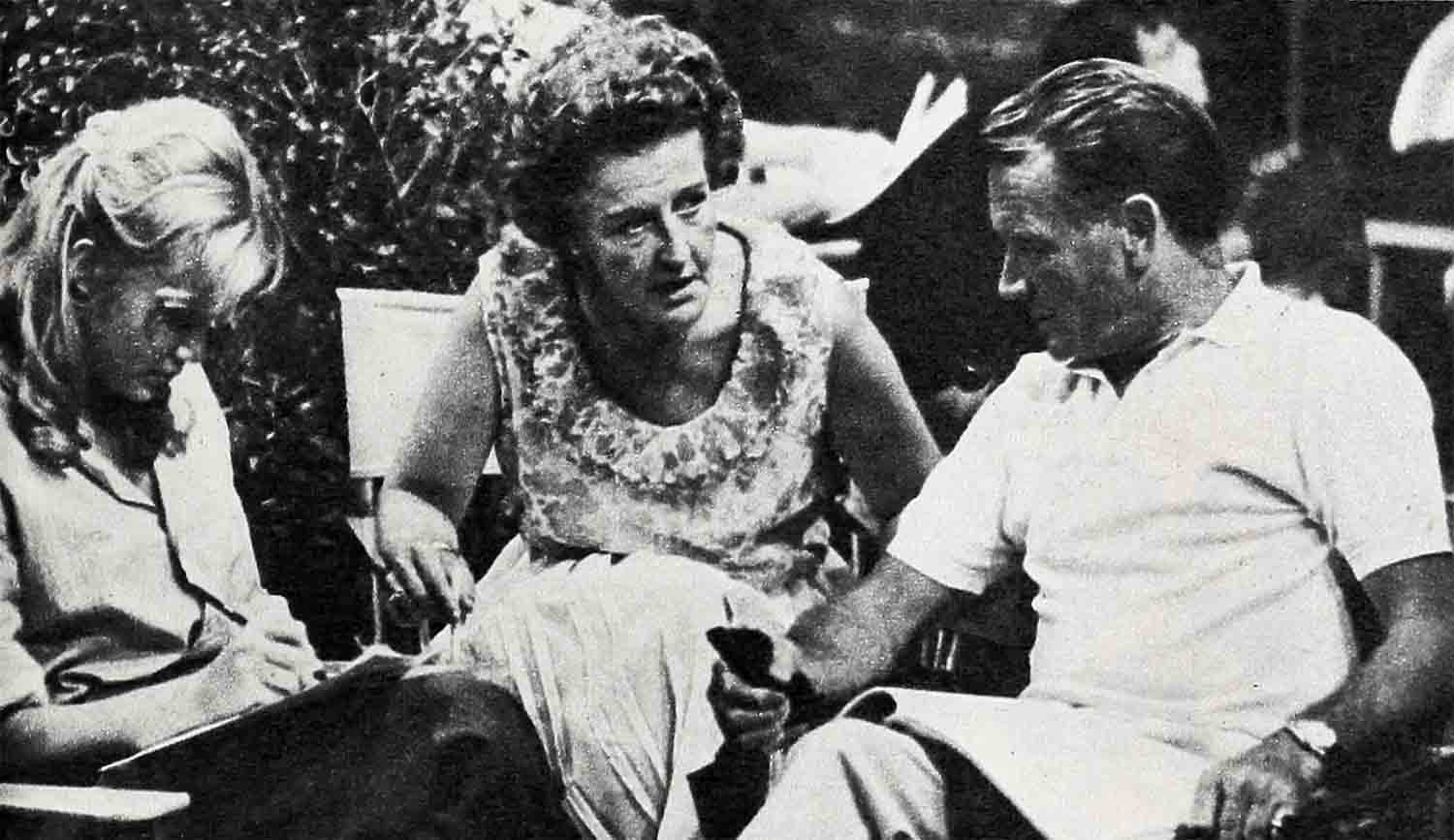
FRED: Why do you do that?
HAYLEY: I don’t know; I’ve always done it. I suppose it’s nerves to a certain extent. But I think it’s just sheer habit, and it’s a very unpleasant habit and I’ve stopped lots of times, and they have got long and elegant; and then something happens to one of them and I give up.
FRED: What’s going to happen when you start to have romance in your life and all those nervous little things are going to come along—you’ll be biting your nails even worse.
HAYLEY: My God, they’ll be up to my elbows. I’d better stop right now.
No place to live
FRED: How did you like Hollywood?
HAYLEY: I liked it very much. I don’t want to live there, though, I don’t think, because it’s very, very filmy, you see; everyone’s filmy. And it’s so lovely to go there for just a little while, then go home.
FRED: What was it you didn’t like about Hollywood?
HAYLEY: Well, a certain amount of unreality about it. I didn’t like to live with it all the time; it’s too much glitter and everything.
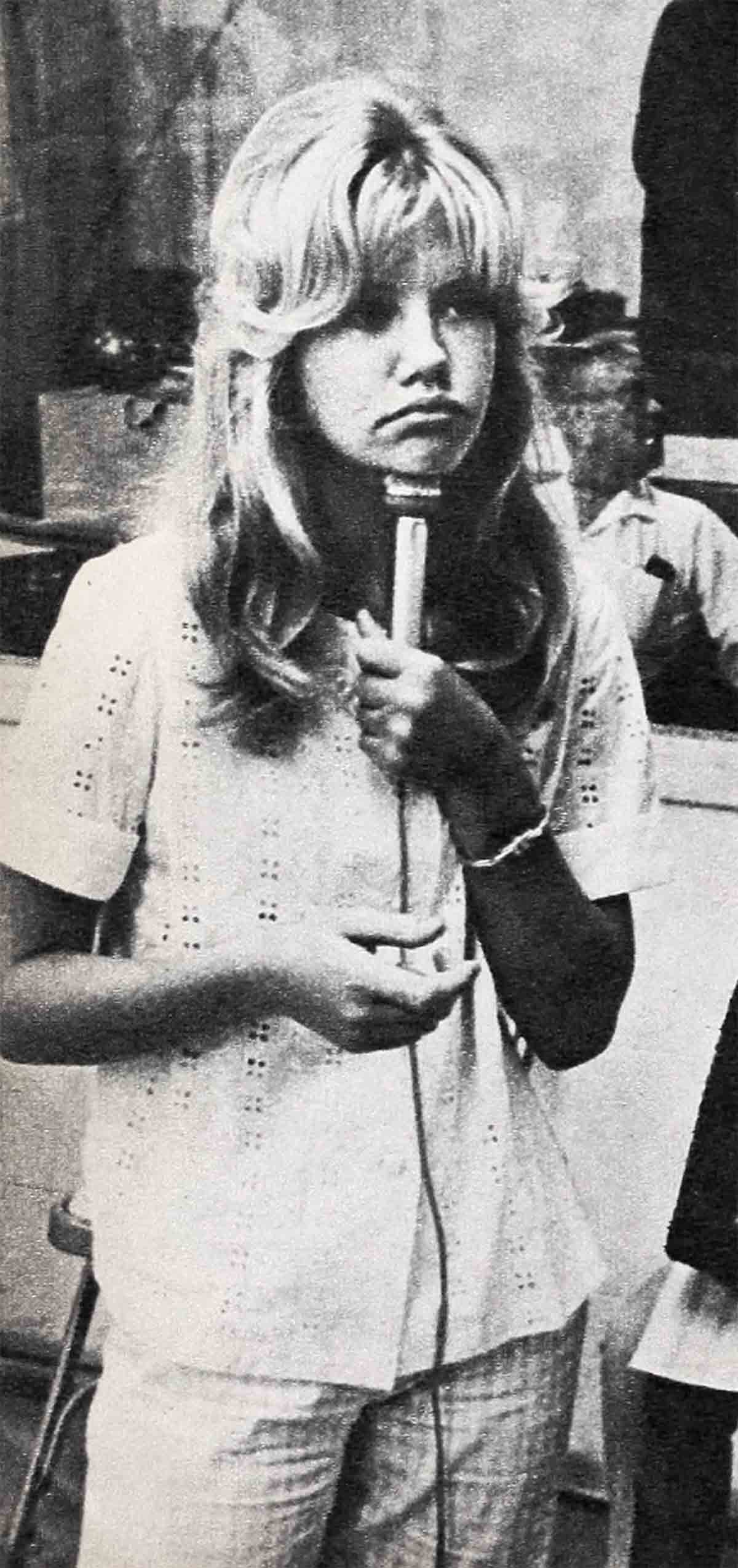
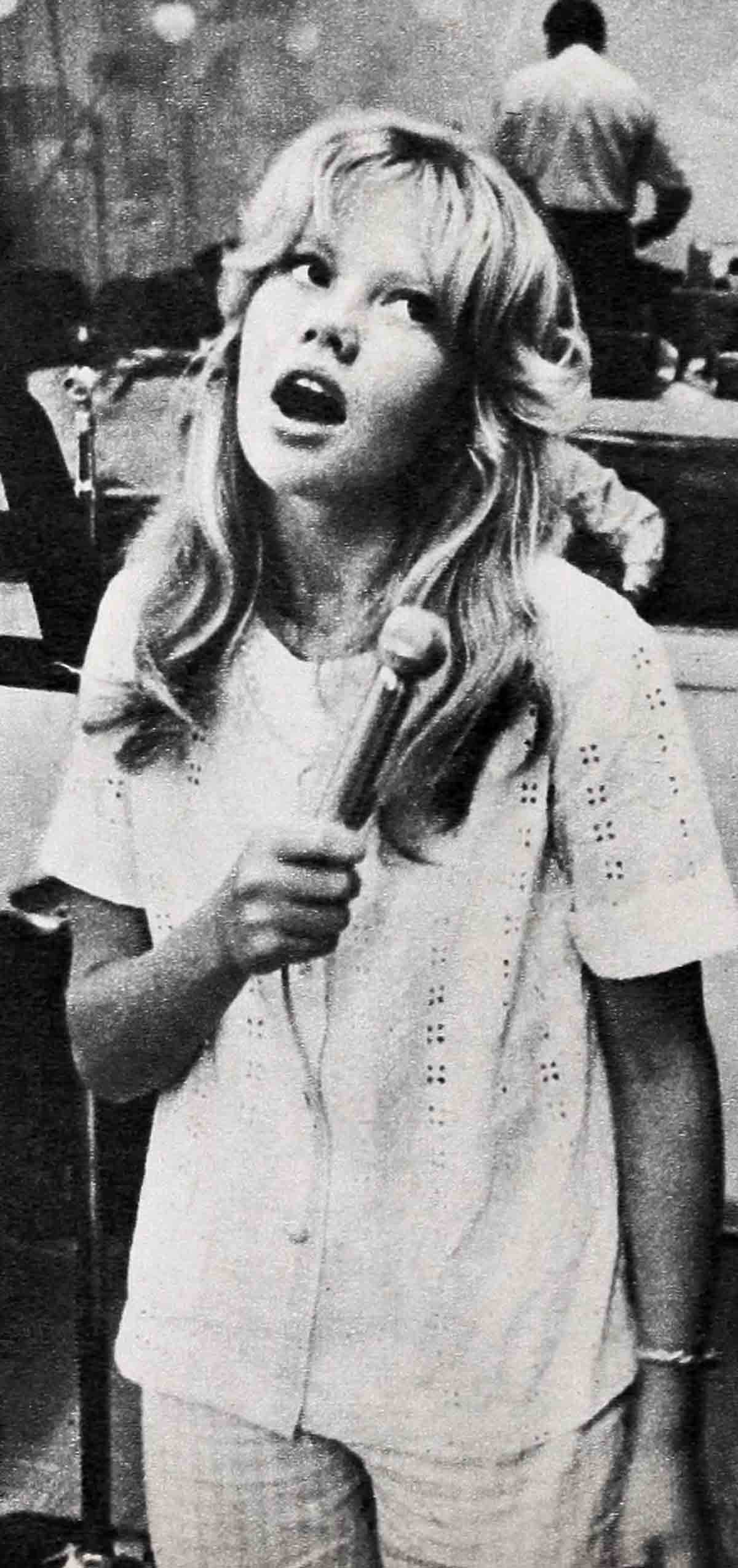
FRED: You like the American guys?
HAYLEY: I think they’re very nice, yes.
FRED: Any kind of comparison you want to make with the English fellows?
HAYLEY: No, I can’t make any comparison.
FRED: What do you want for yourself; or is it too soon to say?
HAYLEY: Man-wise—oh, I don’t care.
FRED: You are not going to be married for a long time, I guess, are you?
HAYLEY: Oh, no. I don’t want to rush into anything, socks and nappies, and things, you know?
FRED: Do you have any rules about marrying or not marrying an actor?
HAYLEY: Well, you never know who might come along. And if you said, ooh. I am never going to marry an actor, you’d look a bit of a Charlie if you do.
FRED: Well, you are probably the most talked about teenager in the world today. Does that weigh heavily on you?
HAYLEY: It depends on the talk, but not greatly.
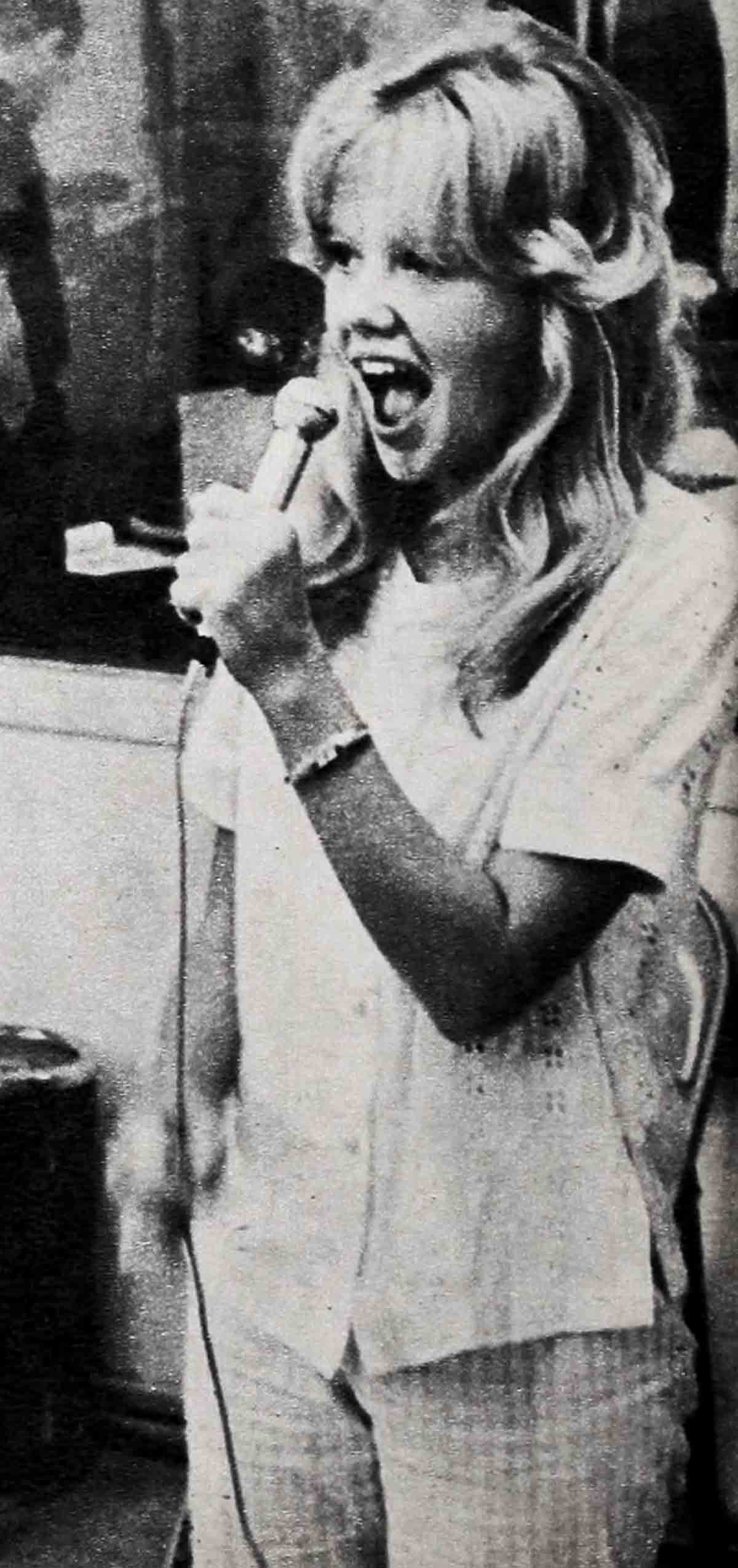

FRED: Well, the talk’s very good. That’s been one of the most remarkable things about you, Hayley. How can you be in the limelight so much and be nice and sweet?
HAYLEY: Oh, I think this is a rather exaggerated thing about the limelight. I mean, there’s not an awful lot of limelight. Perhaps at premieres and the pictures and the people; that’s all exciting. But the actual work, like today: it’s just work; it’s just the work I happen to do instead of going to an office and being a secretary or in a shop, you know? But, anyway, I think that because of Mommy and Daddy I just lead a perfectly normal life.
FRED: How do they do it?
HAYLEY: Well, just by not putting any emphasis on things that would make one feel different. This is just my job, like any other person’s job, you know? And also I think it’s because I’ve been brought up with it, ever since I was a baby; it’s been in the family. So it’s sort of natural that I should do it. But I don’t think it’s anything to get big-headed about.
The real and unreal world
FRED: What about this business of some girls not being able to cope with the unreal world of acting and movies, and they get to believe that this is the real world?
HAYLEY: Ah, well you see that’s where Mommy and Daddy have been so clever, because there’s never been two worlds. This is just where I come and work. Home is the real world. I’ve never thought of it in relation of two different worlds. It’s all one world; it’s my world; the way I live—it’s all just one world. When I go home, I’m normal, and I have supper and I relax in the evening.
I have left school now, but I’d go to school, come back for the holidays, go to the farm, ride around on the farm, and I knew in the back of my mind that when the time came I’d go to the studios and work. So it was just quite normal, like going back to an office.
FRED: The real world is those horses you have always loved so, Hayley, isn’t it?
HAYLEY: Yes, but I’ll tell you something about them. They’ve gone now; that’s what’s so sad.
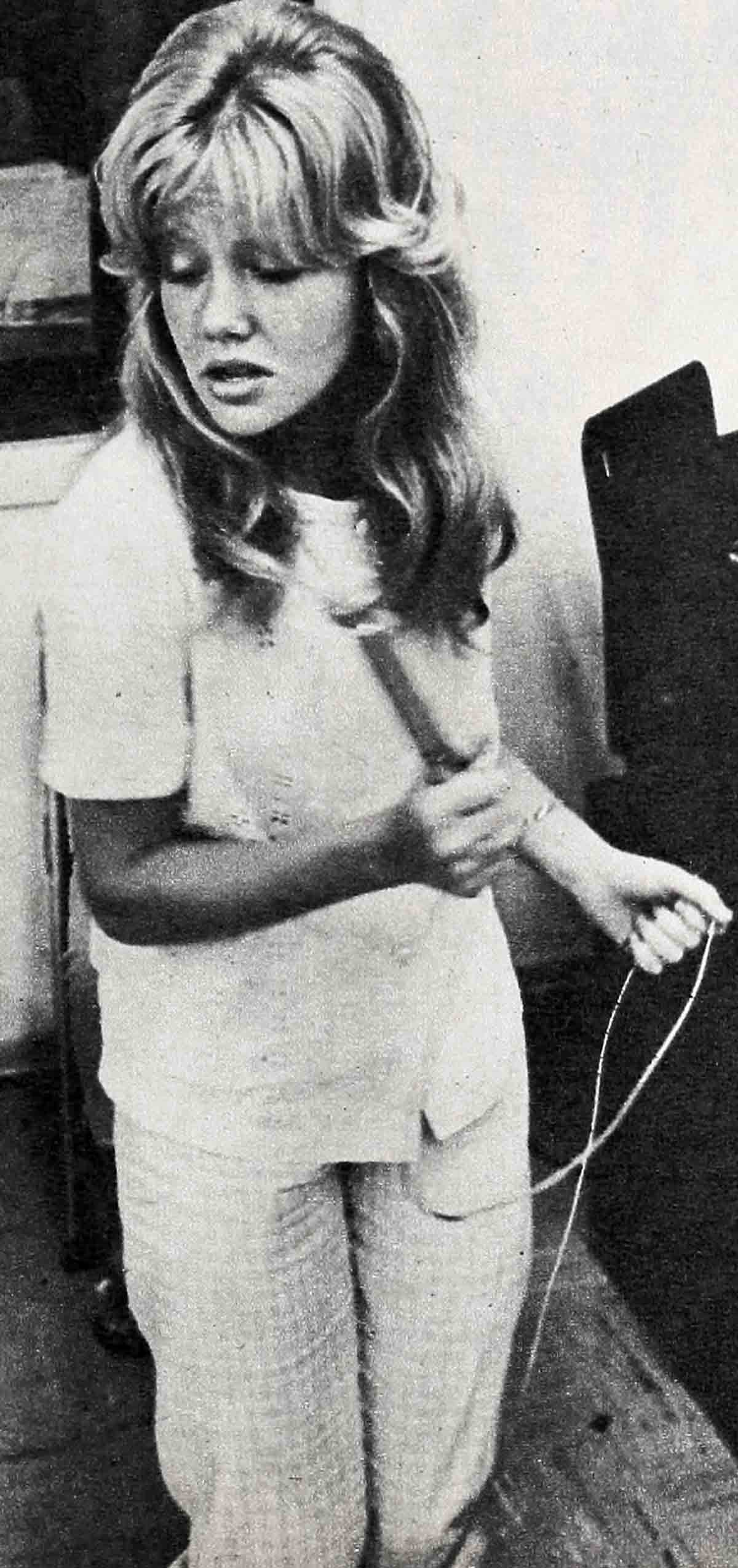
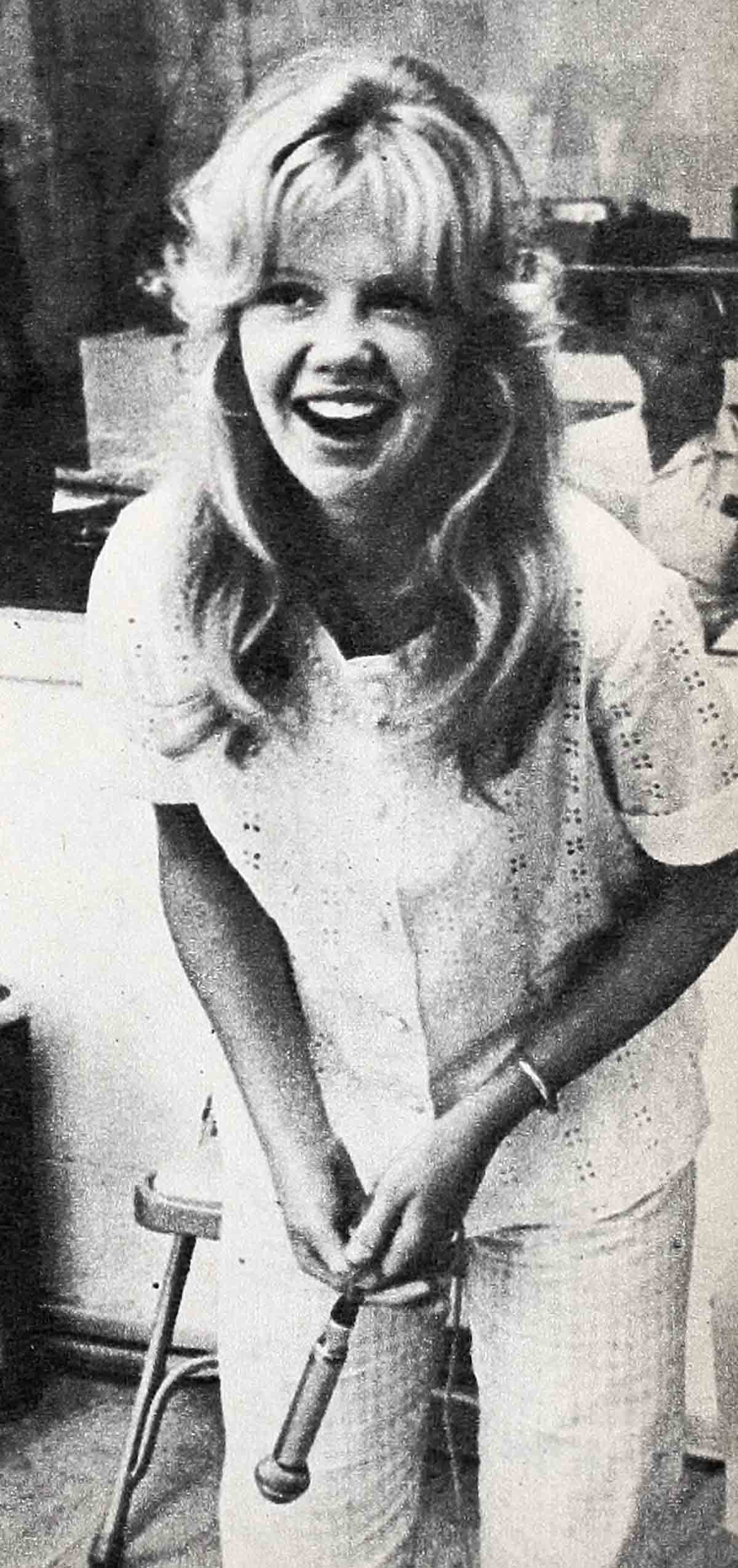
FRED: I know, you sold the farm. And the horses go along with the farm, don’t they?
HAYLEY: Except we didn’t leave the horses to chance; we sent them back to where we got them; we know they’ll be looked after. But I’m not going to be parted from horses, because when we go back to Richmond where we were originally, there’s a marvelous livery stable, and it has beautiful polo ponies.
FRED: Jonathan’s the kid brother. How do you get along with him?
HAYLEY: Very well. Oh, we used to hate each other, used to fight a lot. But he’s grown up now and maybe I’ve grown up, one of the two—I think we both have. And now we’re very good friends. We were always friendly, but you know how brothers and sisters fight? We used to.
FRED: What does he say about your work, Hayley?
HAYLEY: Well, when he sees a film, or something, well, he says what he thinks. If he likes it or he doesn’t, he’s a very good critic.
FRED: Does Jonathan want to be an actor?
HAYLEY: Oh, well, I don’t want to say definitely yes or no, because I don’t know, really. It’s entirely up to him; he’s undecided, shall I say. I expect he’ll do something in the business, to do with theater or films, but in what sort of level I have no idea, because he doesn’t know.
Ladder in her stocking
FRED: How far do you want to go as an actress, Hayley?
HAYLEY: I don’t know, really. Well, I’d like to eventually—oh, my, I’ve got a ladder in my stocking.
FRED: A ladder. We call it a run.
HAYLEY: A run, a run. Oh, yes. If ever I feel I might be able to tackle it. I’d love to try holding a spear or something in the theater, or opening a door, or anything, just to try it, you know, because it must be some marvelous magic thing. I remember when Daddy was in New York doing “Ross.” We used to be in the wings all the time. We sat there in this pitch-dark theater while he was rehearsing. And there is something so exciting about it, even more so than the films. And so I’d love to try that one day.
FRED: Do you go out on dates a lot?
HAYLEY: No, not a lot, because I work a lot, and we seem to travel a lot. Lately, we have traveled a terrific lot.
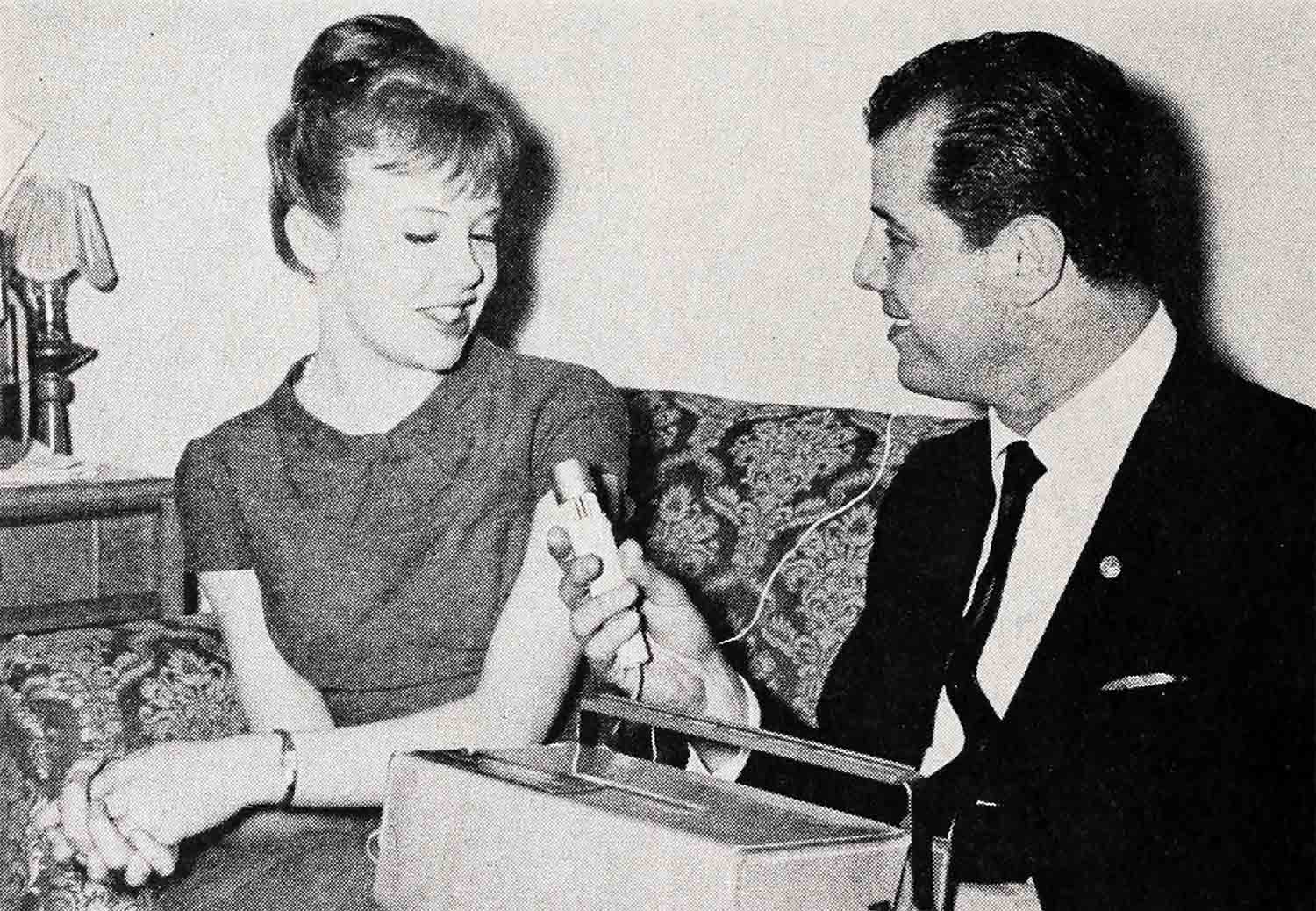
FRED: When you go out on dates, do you double-date, or do you go out with one fellow?
HAYLEY: I like going out with a lot of people, actually. You know, real friends. I prefer to go out with a group. It’s more fun, really.
FRED: How old are the fellows that you go with?
HAYLEY: Sort of seventeen-eighteen-nineteen, that sort of age.
FRED: What do you do on a date?
HAYLEY: Oh, it depends upon the person I’m going out with. To a movie, it could be, or some place to dance, maybe, or dinner, maybe. In England one can’t go to a drive-in or the beach, you know.
FRED: Did you like that California routine of being able to go to drive-ins and the beach?
HAYLEY: Yes, it’s rather dig-worthy.
FRED: Dig-worthy? That’s a new word.
HAYLEY: It is?
FRED: Well, dig of course we know. But dig-worthy is marvelous. It makes sense. Dig-worthy. Great. I dig that.
HAYLEY: Oh, you do? Very good.
You take your heaven and hell
FRED: So. here you are, on top of the world. Can you philosophize about it?
HAYLEY: Philosophize? I don’t know. I know I’m very happy. I’m very happy, and I think life really does depend an awful lot on how you treat it and what you make of it. You know, you take your heaven and your hell with you, and all that sort of stuff. And I think it’s a most marvelous life, this film life, you know, as long as you keep your head and don’t get sort of carried off in the excitement.
FRED: Does it frighten you: the big career that faces you?
HAYLEY: I think it excites me more than frightens me. But there’s a certain amount of fear in it. It is a sort of respectful fear, like God. Oh, gosh, that’s rather a silly thing to say. But you know what I mean? It’s a feeling of sort of waiting, sort of holding your breath. But I think seventeen’s such a big jump from sixteen. It sounds more when you say “I’m seventeen” than saying “I’m sixteen.” So I suppose I had better start pulling myself together and grow up a little.

FRED: About “the Chalk Garden” and the part you play—you play a miserable spoiled brat, don’t you?
HAYLEY: Yes, really. But she has a heart of gold, you see. She’s only spoilt because she thinks nobody loves her, that’s the only reason.
FRED: That is the big moral in “The Chalk Garden”—that you need love in your life?
HAYLEY: Yes. Oh, I’m so excited about this film, to be working with Daddy and Deborah Kerr and Dame Edith Evans. And oh, so much to learn from them.
FRED: They learn a lot from you, too. You know, they are very impressed with you, Hayley. They told me that you were a marvelous new talent, and it’s exciting to work with you.
HAYLEY: Well, it’s marvelous to be working with them. And it’s also so much fun to be doing it with Daddy again, because I haven’t worked with him since I was twelve; the first thing I ever did. And then I didn’t appreciate it. you know, and I didn’t know what I was doing. I just ate sweets and fell down and made a bit of a nuisance of myself. I didn’t really know what was going on. I just said the lines and went, you know. And now I really can appreciate it, because lie’s such a marvelous actor. Working with Daddy—it’s sort of like playing tennis against somebody, instead of just hitting them into a. hedge where they sort of go in, you know.
You have to want to
FRED: Tell me what girls and boys who write to you want to know?
HAYLEY: Oh, they want to know what I like, what sort of horses, that sort of things. And they want pictures.
FRED: Do you get a chance to answer all your mail?
HAYLEY: Well, the ones I read, the special ones, sometimes I answer. And I always try to answer presents.
FRED: Do a lot of them want to be actresses, too?
HAYLEY: Yes.
FRED: What do you advise them?
HAYLEY: Well, I tell them they really have to want to act. Don’t start unless you really want to act.
FRED: Your entrance into adulthood is causing lots of publicity and magazine stories about you.
HAYLEY: Well, it had to come. I had to grow up. I have still got a long way to go, though, I think.
FRED: Are you afraid of growing up?
HAYLEY: Afraid? Uh. well, I suppose a little, because I’m longing to save time, you know.
FRED: Hayley, dear, how does your dad feel about your becoming a full-fledged actress?
HAYLEY: He’s the nicest, most wonderful person about it. He really is—you know. If it wasn’t for him I wouldn’t be anywhere or anything.
FRED: What has he taught you about acting?
HAYLEY: Everything, really. I suppose one knows the sort of things like open your mouth and shut your mouth and smile, you know. But he’s always there, always sort of helping you. He’s marvelous, he really is. He’s so generous—
FRED: Has he ever actually sat down with you and taught you acting, or is it inherited?
HAYLEY: Well, I have grown up with it; perhaps it’s sort of rubbed off. I think everyone has it. if they just know how to use it. Sounds terribly accomplished, doesn’t it? . . . Anyhow, lie’s just wonderful.
FRED: What kind of advice has your father given you, Hayley, that you think could be helpful to others?
HAYLEY: He’s given me a lot of advice all through my life. He always said, whatever happens, try to be very sincere, be real. And he’s really the most ordinary person you could meet anywhere. I think that’s terribly important. Otherwise, you lose everything.
FRED: You are a very normal girl. It’s a very healthy thing. I wish you the best, and many happy returns, Hayley Mills.
THE END
You can see Hayley in “The Chalk Garden,” U-I; “Summer Magic,” Buena Vista. Fred’s “Assignment Hollywood” is heard on coast-to-coast radio. In the New York area, you can hear “Robbin’s Nest,” over station WNEW, Sundays 8 to 12 P.M.
It is a quote. PHOTOPLAY MAGAZINE AUGUST 1963




